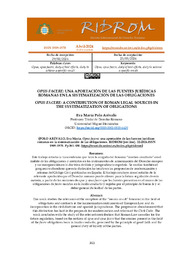Por favor, use este identificador para citar o enlazar este ítem:
https://hdl.handle.net/11000/36651Registro completo de metadatos
| Campo DC | Valor | Lengua/Idioma |
|---|---|---|
| dc.contributor.author | Polo Arévalo, Eva María | - |
| dc.contributor.other | Departamentos de la UMH::Ciencia Jurídica | es_ES |
| dc.date.accessioned | 2025-05-21T12:14:51Z | - |
| dc.date.available | 2025-05-21T12:14:51Z | - |
| dc.date.created | 2024 | - |
| dc.identifier.citation | RIDROM: Revista Internacional de Derecho Romano, Nº. 32, 2024, págs. 361-450 | es_ES |
| dc.identifier.issn | 1989-1970 | - |
| dc.identifier.uri | https://hdl.handle.net/11000/36651 | - |
| dc.description.abstract | Este trabajo estudia la trascendencia que tuvo la acogida del binomio “medios-resultado” en el ámbito de las obligaciones y contratos en los instrumentos de armonización del Derecho europeo y su incorporación en la doctrina civilista y jurisprudencia española. Se analiza también el progresivo abandono que esta distinción ha tenido en las propuestas de modernización y reforma del Código Civil publicadas en España. El trabajo concluye con el estudio de la relevante aportación que el Derecho romano puede ofrecer para la futura regulación de esta materia, a partir de las nociones de opus y opus facere que las fuentes presentan en el marco de las obligaciones de facere nacidas en la locatio-conductio y regidas por el principio de buena fe y el deber general de lealtad de las partes. | es_ES |
| dc.description.abstract | This work studies the relevance of the reception of the “means-result” binomial in the field of obligations and contracts in the harmonization instruments of European Law and its incorporation in the civil doctrine and spanish jurisprudence. The progressive abandonment that this distinction has had in the proposals for modernization and reform of the Civil Code. The work concludes with the study of the relevant contribution that Roman Law can offer for the future regulation, based on the notions of opus and opus facere that the sources present in the field of the facere obligations born in locatio-conductio, governed by the principle of good faith and the general duty of loyalty of the parties. | es_ES |
| dc.format | application/pdf | es_ES |
| dc.format.extent | 90 | es_ES |
| dc.language.iso | spa | es_ES |
| dc.publisher | Universidad de Oviedo | es_ES |
| dc.rights | info:eu-repo/semantics/openAccess | es_ES |
| dc.rights | Attribution-NonCommercial-NoDerivatives 4.0 Internacional | * |
| dc.rights.uri | http://creativecommons.org/licenses/by-nc-nd/4.0/ | * |
| dc.subject | Opus | es_ES |
| dc.subject | opus facere | es_ES |
| dc.subject | duty of best efforts | es_ES |
| dc.subject | duty to achieve a specific result | es_ES |
| dc.subject.other | CDU::3 - Ciencias sociales::34 - Derecho | es_ES |
| dc.title | Opus facere Una aportación de las fuentes jurídicas romanas en la sistematización de las obligaciones | es_ES |
| dc.title.alternative | OPUS FACERE: A CONTRIBUTION OF ROMAN LEGAL SOURCES IN THE SYSTEMATIZATION OF OBLIGATIONS | es_ES |
| dc.type | info:eu-repo/semantics/article | es_ES |

Ver/Abrir:
Opus facere.pdf
1,27 MB
Adobe PDF
Compartir:
 La licencia se describe como: Atribución-NonComercial-NoDerivada 4.0 Internacional.
La licencia se describe como: Atribución-NonComercial-NoDerivada 4.0 Internacional.
.png)